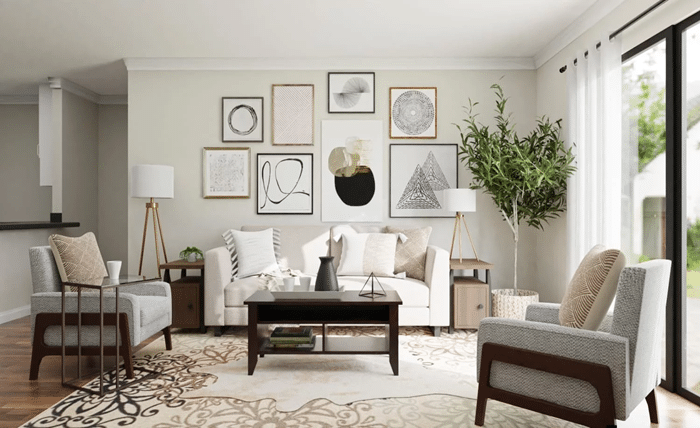Adding layers and texture to a room is one of the most effective ways to create a warm, inviting, and visually interesting space. Texture gives depth to a design, while layers create a rich, multi-dimensional look that feels complete and cozy. Whether you’re decorating a bedroom, living room, or any other space, here are some creative ways to introduce layers and texture into your home.
- Mix Materials
One of the easiest ways to add texture is by mixing different materials throughout your room. For example, you can pair soft textiles like wool and velvet with harder surfaces like wood, metal, or stone. A wooden coffee table paired with a plush velvet sofa creates a beautiful contrast, while adding a stone or concrete planter next to soft, flowy curtains introduces balance and visual interest.
Don’t be afraid to mix natural materials like rattan, leather, or jute with modern elements such as polished metals or glass. This blend of materials helps achieve a layered look that feels rich and dynamic.
- Layer Rugs
Layering rugs is a stylish way to add both texture and depth to any room. Start with a larger neutral rug as a base, like a jute or sisal rug, and place a smaller, more vibrant or patterned round area rugs on top. This not only creates a focal point but also adds an extra layer of coziness underfoot.
This approach works particularly well in living rooms or bedrooms, where a plush sheepskin or shag rug can be layered over a more functional flatweave or natural fiber rug. The combination of different textures makes the space feel more intimate and luxurious.
- Incorporate Textured Walls
Textured walls are a bold and creative way to introduce depth to a room. Wall treatments like wallpaper, beadboard, or shiplap can add instant texture to what would otherwise be a plain wall. Textured wallpapers, especially those with subtle patterns or raised designs, create a tactile surface that draws the eye.
For a more understated look, consider plastering or applying limewash paint, which adds a subtle, organic texture to walls. If you’re not ready for a full wall treatment, textured artwork or woven wall hangings are excellent alternatives that offer texture without a permanent commitment.
- Play with Pillows and Throws
Textiles are an easy and versatile way to introduce layers into any room. Adding a variety of pillows in different fabrics like linen, velvet, silk, or knits instantly adds texture to your seating areas or bed. Choose pillows in varying sizes and patterns to create a more layered and dynamic look.
Pair these pillows with throws or blankets draped casually over sofas or chairs. A chunky knit throw or a faux fur blanket adds a soft, cozy texture that invites you to curl up. Mixing different textiles in similar color palettes creates a unified yet layered design.
- Use Decorative Accessories
Decorative accessories like ceramics, woven baskets, and sculptures introduce texture in subtle but impactful ways. A collection of vases with varying finishes—glossy, matte, or rough-hewn—adds depth to a table or shelf. Wicker baskets are not only functional for storage but also provide a natural, earthy texture that contrasts well with smoother surfaces like countertops or shelving.
You can also experiment with woven trays, beaded curtains, or macramé plant hangers, which add texture while serving a practical purpose. These small, creative touches help build layers in the room.
- Incorporate Layered Lighting
Lighting plays a critical role in adding layers to a room. Instead of relying on a single overhead light, use layered lighting that includes a mix of table lamps, floor lamps, and wall sconces. Lighting fixtures themselves can introduce texture, especially when choosing lamps with ceramic bases, textured shades, or metal finishes like brass or bronze.
The varying light sources create different shadows and highlights, which enhances the room’s overall depth. Incorporating candles or string lights can further soften the room and introduce an extra layer of warmth.
- Add Greenery
Plants bring an organic, natural texture that instantly livens up any space. The leaves of different plants, whether they are smooth, spiky, or feathery, provide unique layers of texture. Place plants in woven baskets, ceramic pots, or even hanging planters to enhance the tactile quality.
Large indoor plants like a monstera or fiddle-leaf fig create a dramatic focal point, while smaller plants like succulents or ferns can add delicate layers of green throughout the room.
Final Thoughts
Bringing layers and texture into your room can be as simple as incorporating different materials, fabrics, and accessories or as bold as textured walls and layered lighting. The key is to combine different textures thoughtfully, creating a harmonious and visually rich space that feels both welcoming and stylish. With these creative approaches, you can easily add depth, warmth, and personality to any room in your home.

